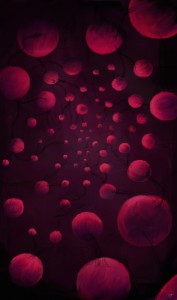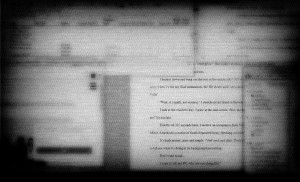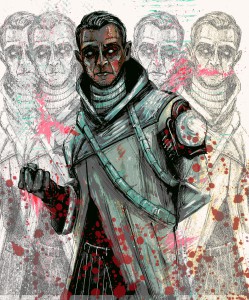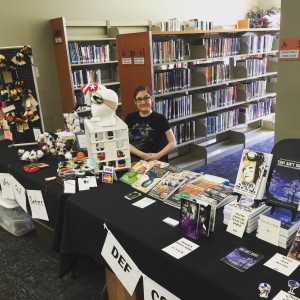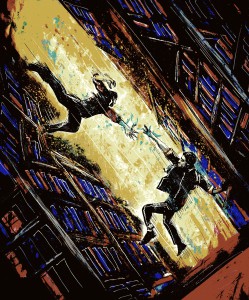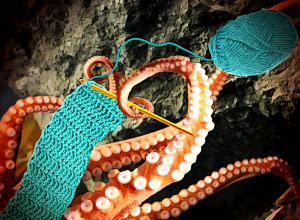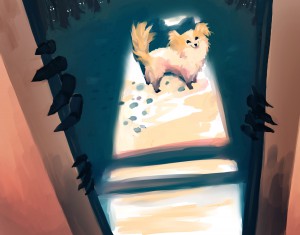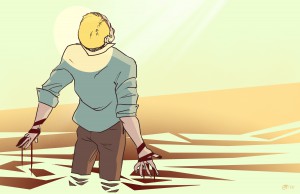An essay by Richard Gentry, as provided by R. Scott Shanks, Jr.
Art by Leigh Legler
I am not mad. Altered, certainly, as who would not be in my profession? Who would not be, having seen the things I have seen, and done what I have had to do? Far from being confused, my mind is sharper than before, my senses are not blunted but honed to razor edges of discernment, and my body, both the natural components and the improved, is kept to a rigorous maintenance schedule.
I have been scrupulous in that since my injuries in the war, which gave me my first replacements. I felt that they fell short, being mainly cosmetic, and turned my professional interest, that being engineering, to improving them. It was short work for me to replace the rude peg-leg with a network of pneumatic cylinders arranged on a pinned frame that acted as a normal leg might act. I had very nearly the range of motion and ease of use as I had with my original, flesh leg.
The prototype was rough and funds were dear by this point, so I went to the provider of my original prosthetic with a proposal; he would provide funding for the final improvements, and I would, in turn, hand over the design to him for use as he saw fit. His counter to my proposal, on seeing my design, was that I would join him and continue my work, creating for medicine what it so sorely lacked–solutions instead of palliatives.
And so I came to work for Halbert Ashcroft.
When I met him, he seemed nothing but an unappealing, feeble, and skeletal man in a wheeled chair, unable from childhood to even hold himself upright due to a variety of wasting diseases and a weak heart. His interest in my work was not selfless nor even oriented on profit; my first duties were to fit him with legs to replace his own wasted ones. These worked, of course, but his emaciated body could not summon even the strength to balance him, so were removed again. Instead, I built him a motorized cart, powered by two counter-rotating flywheels that provided stabilizing mass and motive force to take him anywhere wheels could go.
I had expected that this device would be placed immediately before the public, and that many of the infirm would benefit from it. Ashcroft’s business interests already included the manufacture of the more ordinary sorts of wheeled chairs; it seemed natural to me that he would move the improved model to the general good. Such was not the case. His chair, and his own offensively leering person, were placed before the public, but not to offer up the motorized chair. Instead, he touted his company’s products and implied that all of his existing inventory would give the freedom and mobility he himself enjoyed.
I was disquieted, but he had placed other design tasks before me that consumed my attention; I had little time to attend to what was, in the end, business. His right hand was arthritic beyond use. I gave the matter my full attention and soon he had replacement joints shining from the nest of wrinkled liver-spots, a quartet of gleaming pistons operating the movements of his forefinger, the whole borrowing power from the flywheels of his cart. The intricacies of the mechanism in the wrist, in particular, required more of me than human eyes could manage, and I augmented my own left eye with mountable lenses that might be changed out to specific need.
When the hand was in place, Ashcroft had an eye of his own made, removing the entire front portion of his right eye and its blinding cataracts and mounting a housing directly to his skull, one with sufficient depth to permit varying focus for the lenses held there. I dreamed of the blind made to see. He dreamed of greater sensation caused by his own revised person, and of turning that attention into increased sales.
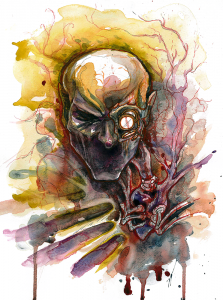
The pinnacle of his improvements, the tribute that he unwittingly made of his foul person at the altar of my genius, was his heart. His own was prone to stuttering failure, and he bore the prototype of what I hoped would be the saving of man’s short span, a series of pistons set into his chest, placed with such care and insight that the soft end of each actuator served to compress the chambers of his nearly useless organ, continuing its function for as long as power could be supplied.
To read the rest of this story, check out the Mad Scientist Journal: Spring 2016 collection.
Richard Gentry (Lt, Ret; H.D.Sc) was head of research for Ashcroft Medical Apparatus & Replacements until certain disagreements on troubleshooting procedures caused him to seek a position elsewhere. Shortly afterward, he left the Cherche-Midi prison under informal circumstances involving modified flatware, a small fire, and over two dozen rats found in a roughly augmented state. His current whereabouts are not known, although we continue to hear reports of a limping, clanking form stalking the alleys of Montmarte, guldering about maintenance schedules and tolerances.
R. Scott Shanks, Jr., was introduced to M. Gentry while in the company of the French police, where a firm camaraderie was immediately established. Counter to the opinions of both the prosecutor and the sitting magistrate, he had nothing to do with M. Gentry’s sudden departure from Parisian hospitality. It is true that Mr. Shanks had visited M. Gentry in prison, bringing a bushel-basket of broken clocks and bits of wire–as well as several pounds of rodent bait–but that was intended to augment his own person to improve a bad back and several more personal issues.
Leigh’s professional title is “illustrator,” but that’s just a nice word for “monster-maker,” in this case. More information about them can be found at http://leighlegler.carbonmade.com/.
“The Heart’s Engine” is © 2016 R. Scott Shanks, Jr.
Art accompanying piece is © 2016 Leigh Legler.



